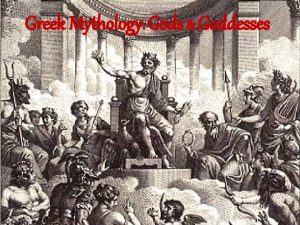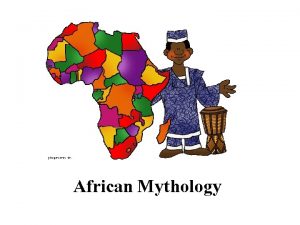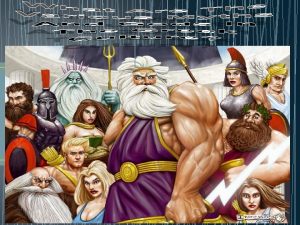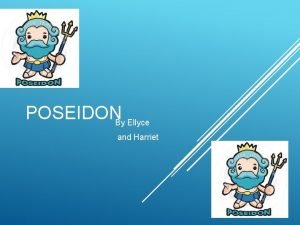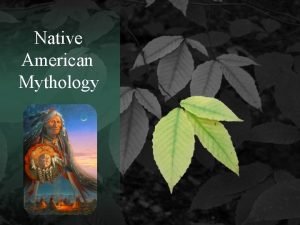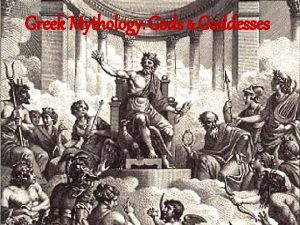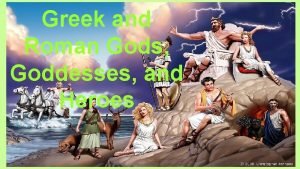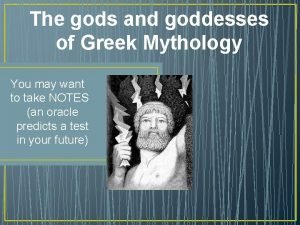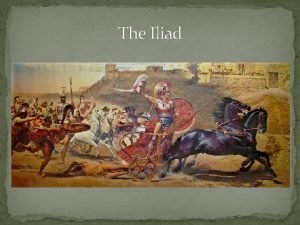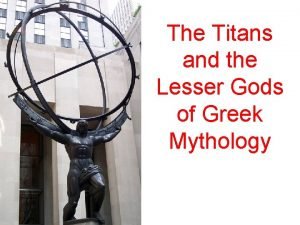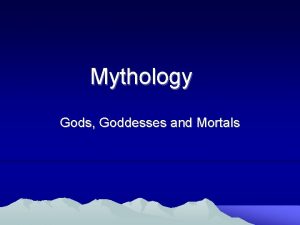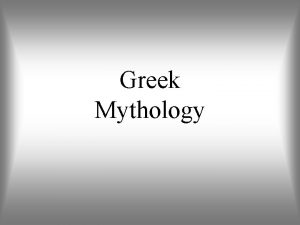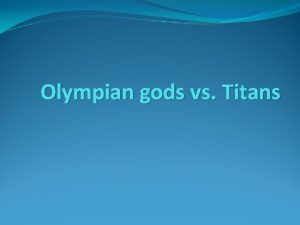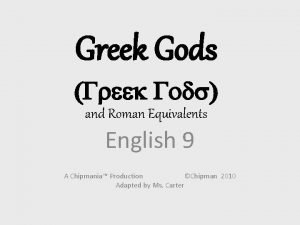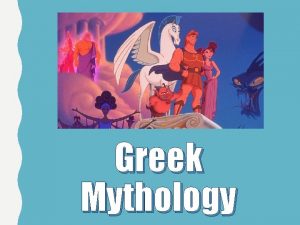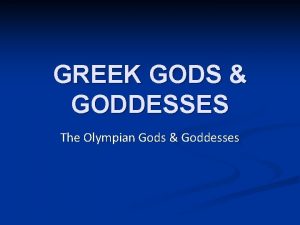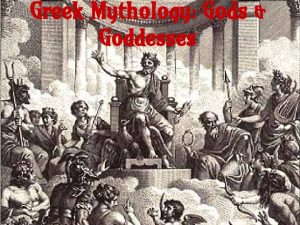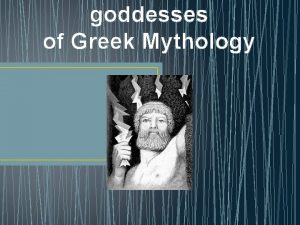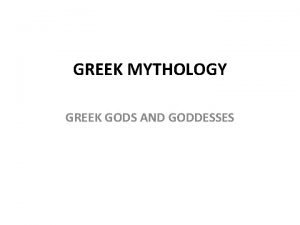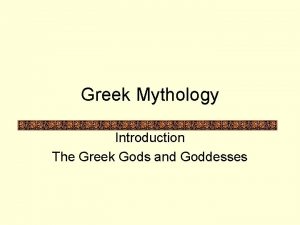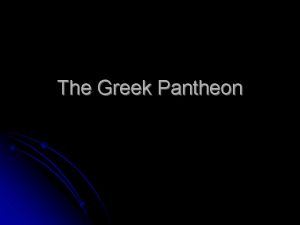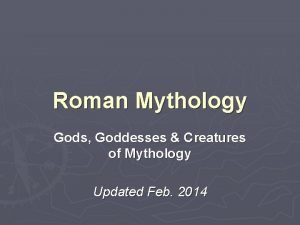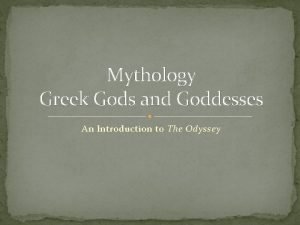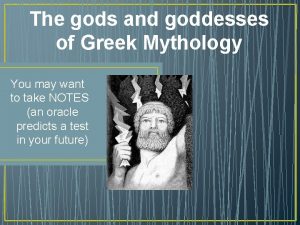Greek Mythology Gods and Goddesses of Greece Home



















- Slides: 19

Greek Mythology Gods and Goddesses of Greece

Home of the Gods • The most powerful gods and goddesses lived on top of a mountain in Greece called Mount Olympus. • This is the highest mountain in Greece.

Personality of the Gods • They looked and acted like humans but had the power of gods. • They were more powerful and more beautiful than humans. • They had human feelings such as love, anger, and jealousy. • They got married, had children, fought with each other, and even got jealous of humans sometimes.

Why do we call it mythology? • A myth is a story that is made to answer some of the biggest questions people ask but cannot answer. • Who are we? Where do we come from? Why do these things happen to us? • In ancient times, myths sometimes explained things that we now know through science, such as why seasons change or why planets move the way they do. • The Greeks used these gods and their stories to explain why things happened to them long ago before they had modern science.

Tell us about the gods

• • • • 12 Major Gods of Mount Olympus Zeus—highest god (king) of Olympians Hera—Zeus’s wife & queen Poseidon—god of the sea Hades—god of the underworld Apollo –god of light and truth Hermes—messenger god Ares—god of war Hephaestus—god of fire Artemis—goddess of hunting Athena—goddess of wisdom Aphrodite—goddess of beauty and love Hestia—goddess of the home Demeter—goddess of corn & harvest Dionysus—goddess of wine

The Epic And how The Odyssey ties into the Epic…

Origin of an epic • Stories about great heroes were told through song. • Later, these songs were written down and were called ______. Once these ____ were written down people began to add supernatural elements, which turned them into _______. • Legends and myths were presented in the form of _____ or _______ and they were episodic. • These episodic legends and myths became known as an epic.

Elements of an Epic • A ______ impressive hero of national or hystoric importance (_____) • A vast _____ involving much of the know n physical world and sometime the land of the _______ as well • Action such as a _______ or ______ taken in search of something of _______ • Evidence of ______ at work • ________ of the hero at the end • Rooted in a specific culture and society • Summons of the ____ • Hero is _____ • Epic descent into the_____

Examples of the Epic: • The Odyssey by Homer (lucky you, we will be reading this one) • The Iliad by Homer (happens before The Odyssey, about the Trojan War, you will read this next year) • The Aeneid by Virgil (a very good version of Homer’s Iliad, copyright laws do not exist in these days, you will also read this next year) • The Divine Comedy by Dante Alighieri (you will read Book 1, The Inferno, of this trilogy next year) • Beowulf told by Bards of the ancient days (Senior year) • Paradise Lost by John Milton (Senior year again)

Epic Conventions • Dues ex machine- “____ the machine”; this is usually used in Greek plays when the main character gets into trouble and the reader thinks that he will not get out a god or goddess steps in and the hero gets out of trouble. • _____ guardian- there to keep the hero from accomplishing his goal; the hero must get past the threshold guardian in order to move. • Epic descent- Part of the narrative structure in an epic; the hero must make a descent to the underworld.

Epic Conventions continued… • Nostos- myth of eternal ______; the hero will begin at _____ and will end up at home; this is in most epics because they are circular in nature • In medias res- “in the______ of things”; the story begins in the middle

The Odyssey An epic poem written by Homer

Homer • Homer was a blind poet who wrote The Odyssey after it had been passed down from Greek singers.

The Epic Poem • “Epic” means VERY long, so an epic poem is a long poem with 5 characteristics. – – – Long narrative (story) Heroic people whose actions determine the fate of a group A long journey with many challenges A large setting (many different places) Gods and other non-human beings are active in the lives of humans

5 Traits of an Epic Hero • Hero is of great size (physically and socially) • Hero has super-human courage and strength • Hero faces supernatural forces • Hero has characteristics valued by his culture • Hero has flaws

The Epic Hero • An epic hero is a “super-human” person from history or legend who goes on a journey and faces many challenges. • Even though the hero does many good things, he still has flaws—things that get him into trouble.

Odysseus: The Epic Hero • Odysseus is the name of the epic hero in the Odyssey. • Odysseus is brave, and he is a good leader. • Odysseus faces many challenges coming home from the Trojan War.

Odysseus’s Journey • • The 10 year Trojan War has ended. When Odysseus gets back on his ship, he yells out that he defeated the Trojans on his own without the help of the gods. He then says that he does not need the help of the gods to get back home to Ithaca. • This makes Poseidon, god of the ocean, mad. Poseidon makes sure that Odysseus’s journey back home is very hard to show him that he does need help from the gods. • Because Poseidon makes his journey so hard, it takes Odysseus 10 years to get home to Ithaca. • What is one of Odysseus’s flaws?
 Goddess family tree
Goddess family tree African mythology gods and goddesses
African mythology gods and goddesses 12 main greek gods
12 main greek gods Ancient greek gods family tree
Ancient greek gods family tree Uranus god
Uranus god Greek god family tree
Greek god family tree Nohoilpi
Nohoilpi Greek gods family tree
Greek gods family tree Pan roman name
Pan roman name Long long ago when the gods and goddesses
Long long ago when the gods and goddesses Shakmet
Shakmet Who is the ruler of all gods
Who is the ruler of all gods Sparta religion
Sparta religion Gods and goddesses in the iliad
Gods and goddesses in the iliad Sighkee
Sighkee What is the greek miracle in greek mythology
What is the greek miracle in greek mythology All about artemis
All about artemis Titans vs gods
Titans vs gods Bulgarian animals
Bulgarian animals Roman equivalents of greek gods
Roman equivalents of greek gods
